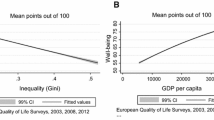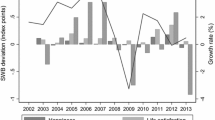Abstract
This study analyses the relationship between subjective and objective measures of well-being in selected European countries using the data of the European Community Household Panel (ECHP). In the first part of the paper, we develop a random-effect ordered probit model, separately for each country, relating the subjective measure of income satisfaction to actual income, and controlling for some individual and household socio-demographic fixed effects. In the second part of the paper, we fit a Bayesian cross-classified multilevel model, in order to control for intra-family correlation in subjective well-being, which actually appears to be present.
Similar content being viewed by others
References
Brickman, J. and D.T. Campbell: 1971, ‘Hedonic relativism and planning the good society’, in Adaptation Level Theory: A Symposium (Academic Press, New York)
Browne W.J. (2002). MCMC Estimation in MLwiN. Centre of Multilevel Modelling, Institute of Education, University of London
Butler J.S. and Moffitt R. (1982). A computationally efficient quadrature procedure for the one-factor multinomial probit model. Econometrica 50: 761–764
Cerioli R. and Zani S. (1990). A fuzzy approach to the measurement of poverty. In: Dagum, C. and Zenga, M. (eds) Income and Wealth Distribution, Inequality and Poverty, Studies in Contemporary Economics, pp 272–284. Springer Verlag, Berlin
Cheli R. and Lemmi A. (1995). A totally fuzzy and relative approach to the multidimensional analysis of poverty. Economic Notes 1: 115–134
A. E. Clark (2003). ‘Unemployment as a social norm: Psychological evidence from panel data’. Journal of Labor Economics 21(2): 323–351
Clark A. and Oswald A.J. (1994). Unhappiness and unemployment. The Economic Journal 104: 648–659
Clark A. and A.J. Oswald: 2002, Well-Being in Panels, Delta, Mimeo (http://www2.warwick.ac.uk/fac/soc/economics/staff/faculty/oswald/)
Diener E. and Biswas-Diener R. (2002). Will money increase subjective well-being?. Social Indicators Research 57: 119–169
Dubois R.A. and Prade H.: 1980, Fuzzy Sets and Systems (Academic Press, Boston)
Easterlin, R. A.: 1974, ‘Does economic growth improve human a lot?’, in Nations and Households in Economic Growth: Essays in Honour of Moses Abramovitz (Academic Press, New York)
Easterlin R.A. (2001). Income and happiness: Towards a unified theory. Economic Journal 111: 465–484
Easterlin, R.A.: 2003, ‘Happiness of women and men in later life: Nature, determinants and prospects’, in M.J. Sirgy, D. Rahtz and A.C. Samli (eds.), Advances in Quality-of-Life Theory and Research, vol. 20, Social Indicators Research Series, Kluwer, pp. 13–25
Frey B. and Stutzer A. (2000). Maximising happiness?. German Economic Review 1: 145–167
Headey, B. and M. Wooden: 2003, ‘The effect of wealth and income on subjective well-being and ill-being’, presented at the 32nd Conference of Economists (Australia and New Zealand), 29 September–1 October, 2003, ANU, Canberra
Kenny C. (2005). Does development make you happy? Subjective well-being and economic growth in developing countries. Social Indicators Research 73: 199–219
Kohler H. P., Behrman J. R. and Skytthe A. (2005). Partner + children = happiness? The effects of partnerships and fertility on well-being. Population and Development Review 31(3): 407–445
Maggino, F. and S. Schifini D’Andrea: 2003, ‘Different scales for different surveys methods: validation in measuring the quality of university life’, in M. J. Sirgy, D. Rahtz and A.C. Samli (eds.), Advances in Quality-of-Life Theory and Research, vol. 20, Social Indicators Research Series, Kluwer, Dordrecht pp. 233–265
McDonald P. (2000). Gender equity in theories of fertility transition. Population and Development Review 26(3): 427–439
McKelvey R.D. and Zavoina W. (1975). A statistical model for the analysis of ordinal dependent variables. Journal of Mathematical Sociology 4: 103–120
Michalos A. (1985). Multiple discrepancy theory. Social Indicators Research 16: 347–413
Mullis R. (1992). Measures of economic well-being as predictors of psychological well-being. Social Indicators Research 26: 119–135
Murphy M. (1996). The dynamic of a household as logical concept and its use in demography. European Journal of Population 12: 363–381
Nieboer A., Lindenberg S. and Boomsma A. (2005). Dimensions of well-being and their measurement: The SPF-IL Scale. Social Indicators Research 73: 313–353
Peracchi F. (2002). The European Community household panel: A review. Empirical Economics 27: 63–90
Prince, M. and C. Manolis: 2003, ‘Consumer income and beliefs affecting happiness’, in M. J. Sirgy, D. Rahtz and A.C. Samli (eds.), Advances in Quality-of-Life Theory and Research, vol. 20, Social Indicators Research Series, Kluwer, Dordrecht pp. 27–39
Robinson W.S. (1950). Ecological correlations and the behaviour of individuals. American Sociological Review 15: 351–357
Snijders T. and Bosker R. (1999). Multilevel Analysis. Sage Publications, London
Spiegelhater D.J., Best N.G., Carlin B.P. and Linde A. (2002). Bayesian measures of model complexity and fit. Journal of the Royal Statistical Society Series B64: 583–640
Suthers, K., Y. Saito and E. Crimmins: 2003, ‘Emotional well-being among older persons: a comparative analysis of the 70+ population in Japan and the United States’, in M. J. Sirgy, D. Rahtz and A.C. Samli (eds.), Advances in Quality-of-Life Theory and Research, vol. 20 Social Indicators Research Series, Kluwer, Dordrecht pp. 41–50
UNDP: 2005, Human Development Report, New York. http://hdr.undp.org/reports/global/2005/
Pragg B.M., Frijters P. and Ferrer-i-Carbonell A. (2002). The Anatomy of Subjective Well-Being. Institute Discussion Papers, Tinbergen
Veenhoven R. (1984). Conditions of Happiness. Kluwer, Dordrecht
Veenhoven R. (1992). Happiness in Nations. Erasmus University, Rotterdam
Yetim U. (2003). The impact of individualism/collectivism self-esteem and feeling of mastery on life satisfaction among the Turkish University students and academicians. Social Indicators Research 61: 297–317
Zadeh L. A. (1965). Fuzzy sets. Information and Control 8: 338–353
Author information
Authors and Affiliations
Corresponding author
Additional information
The research was financially supported by the Italian Ministry of University and Scientific Research and by the 5th European Research Programme (FELICIE – Future Elderly Living Conditions In Europe, No. QLRT-2001-02310, http://www.felicie.org). We gratefully acknowledge the contribution of an anonymous referee.
Rights and permissions
About this article
Cite this article
Seghieri, C., Desantis, G. & Tanturri, M.L. The Richer, the Happier? An Empirical Investigation in Selected European Countries. Soc Indic Res 79, 455–476 (2006). https://doi.org/10.1007/s11205-005-5394-x
Accepted:
Published:
Issue Date:
DOI: https://doi.org/10.1007/s11205-005-5394-x




